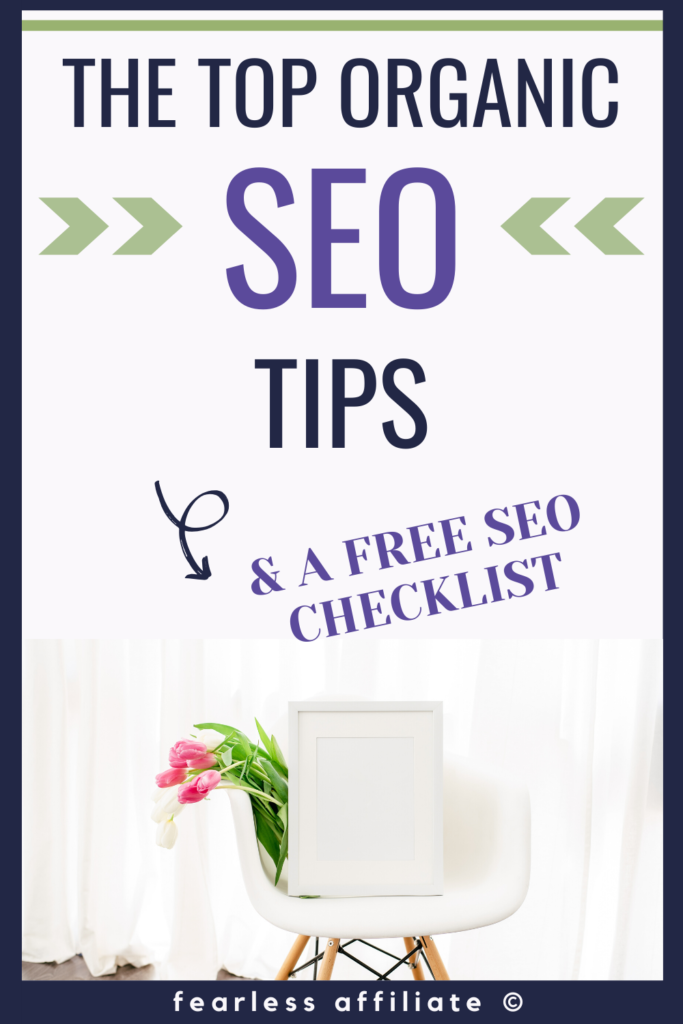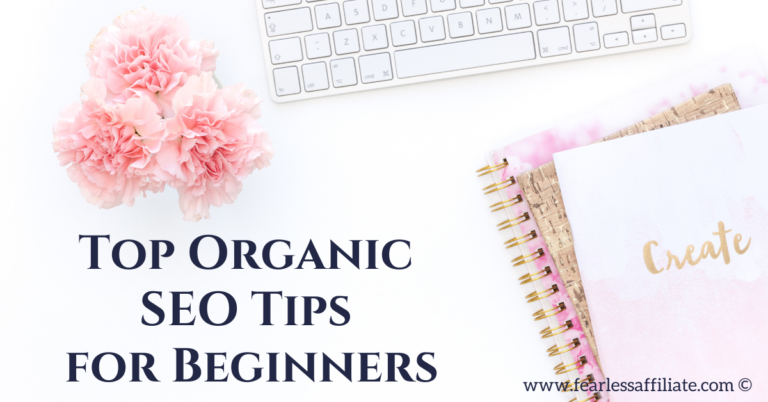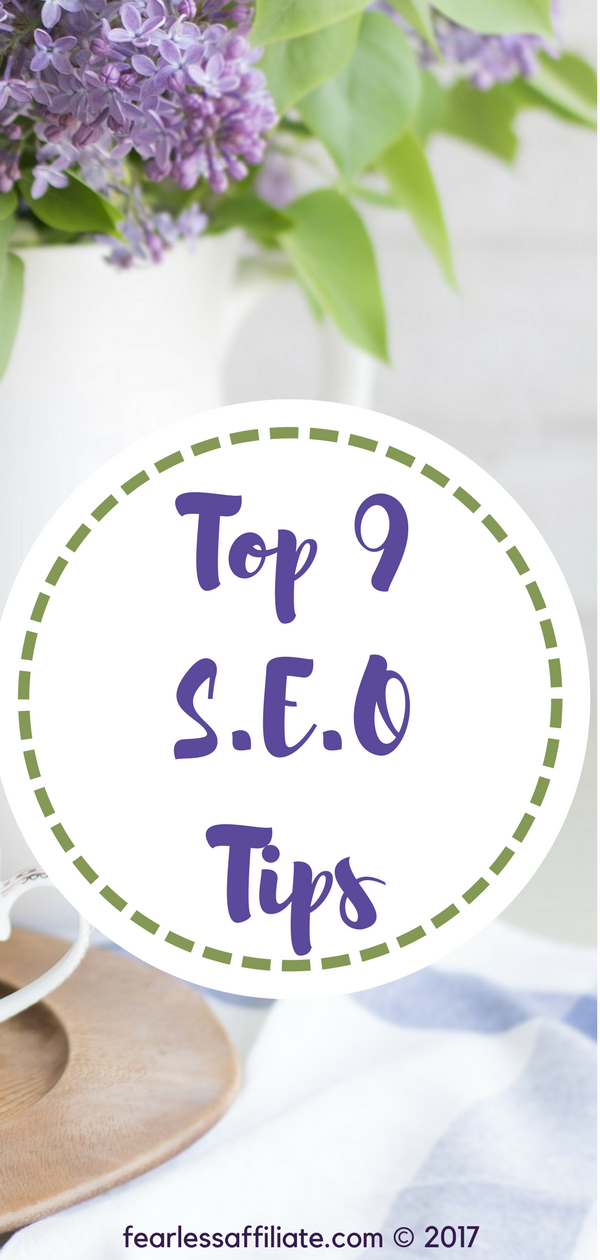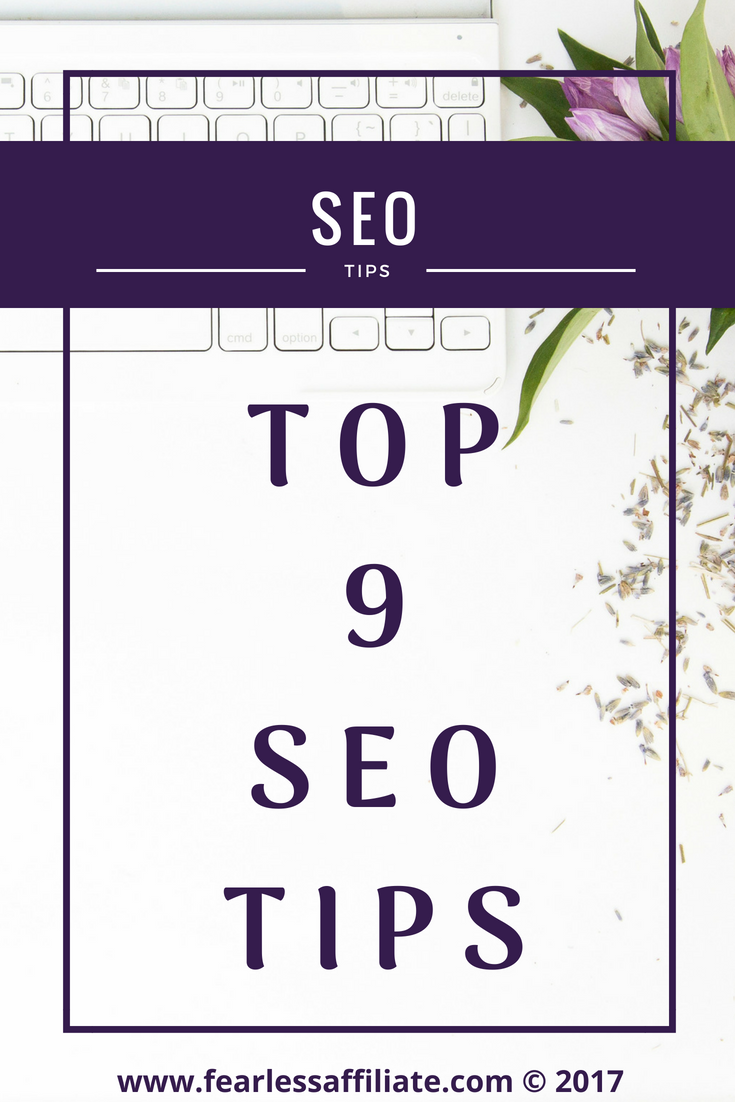Use my organic SEO tips for beginners to start maximizing your on-page optimization. SEO stands for Search Engine Optimization, with the main point here being OPTIMIZATION.
Optimizing blog posts is what bloggers do to rank higher in search engines. Google ranks by authority and relevance, which you can achieve with quality content and fully researched topics.
As well, proper SEO creates a pleasant reading experience for your website visitors. #win-win
This post was originally published on June 21, 2017 and has been updated to be current with new information.
Welcome to Fearless Affiliate. My name is Irma and I help new bloggers to learn the ropes. There is a lot to take in that first year of blogging, from choosing a niche to changing your mindset from worker bee mentality to that of successful entrepreneur.
I like to focus on practical information and positive thinking, so if that sounds good to you please sign up for my weekly newsletter of tips and free stuff for bloggers. Sign up and get your SEO Quick Start Guide to follow along as you read through this post.
Why Is Organic SEO Important?
And what do I mean by “organic” SEO?
Organic means that you are gaining your search engine results page (SERP) rankings by doing standard on-page SEO. Organic ranking does not include PPC ads in the results. It is strictly you optimizing your writing.
Google is always working on ways to improve the results when a user searches.
When the Hummingbird algorithm came out, it was made to analyze and rank content in terms of topics as opposed to keywords. This means that Google will rank you better if your content is fully explored.
Longer, more detailed posts are the way to go now.
You will need to do your homework and answer the 5 w’s, and essentially become a true “authority” in all of your posts to get the most from Google’s algorithms.
Here are some tips to help you become an SEO expert.
Top Organic SEO Tips
1 – You must be clear about what your audience is looking for
And how you can provide it in a sea of competition.
There are over 3 billion people online EVERY DAY. You need to know who these searchers are and how to attract their attention as part of your overall SEO strategy.
One of the best ways to get clear is by niching-down your message.
Easily do this by doing the Avatar exercise to figure out who you are writing to. I have an 8-page Worksheet to help you sort out your perfect customer/buyer persona/avatar.
Your ideal customer is looking for you. Figure out who they are so you can start connecting to them.
2 – Focus on quality long-form content that answers one problem
Google is trying to distance themselves from all the bad practices that helped people gain rank from stuffing keywords and using fake seo backlinks. Backlinks happen naturally when other people link to your website, and Google loves them.
But Google does not love faked backlinks. Those days are gone and the rules are stricter.
The easiest way to avoid penalties while climbing the ranks naturally is to write longer blog posts that fully flesh out one topic only.
Write posts that are a minimum of 1500 words. 2,000+ words is better.
Follow the guidelines by Brian Dean of Backlinko, and create skyscraper content worthy of ranking in spot #1 on page #1. This strategy ensures that you create content that is already popular. And it is a great way to learn how to do SEO.
If you are wondering how long it takes to rank naturally, Ahrefs has an interesting read aptly titled “How Long Does It Take to Rank”
3 – Have only one main idea for your post.
Use Google to see what kinds of questions people ask about in your niche. Go to Google, and start typing in your idea. See what kind of search results you get…do they match what you are looking for?
Related Post: Easy Keyword Research for Beginners
Pick one theme or idea for your post and write about that.
If you think your post has several answers or multiple ideas, consider breaking it into two or more posts.
Giving visitors the best and most authoritative experience will bring them back again, and that is the point of SEO.
4 – Correctly match the post’s title
Do not make the mistake of using a juicy title to intrigue visitors and then not have the content to match! If you blog title says that the post is about blue poodles, then the post should be about blue poodles.
Not a landing page to an affiliate product.
5 – You should know enough about your subject to write 1,500 to 3,000+ words using your focus keyword.
The more in-depth and detailed the post, the better the reader experience.
Use a plugin to add an arrow button to your post that allows readers to get back to the top of the page. Or create a ‘jump to’ table of contents to create a better user experience.
This goes a long way in creating a fan base, as people will know that they can count on you to have the information that they need. Encourage your audience to share your posts as well.
Related Post: 101 Great Blog Post Titles That Really Work (these work for email subject lines as well)
6 – Write posts that use a normal, conversational tone
And that matches a user’s ability to search using voice, which is more natural sounding.
Have your post give off an air of a casual, friendly speaker giving information to a friend. Use common search terms and front load them into your title. Sprinkle related terms into the post.
Googles latest algorithm update shows searchers posts based on the intent of the search.
Exact match keywords and phrases do not guarantee that you will get on page one.
I was just thinking that something was up when I was searching for an exact-match blog post title and the Google search results were showing me all manner of blog posts except an exact match!
Two days later I read this post “The Penalty-Proof SEO Strategy” which verified what happened to me.
[click_to_tweet tweet=”The word is out! Proper SEO is no longer about exact match keywords and is more about the intent of the blog post. ” quote=”The word is out! Proper SEO is no longer about exact match keywords and is more about the intent of the blog post. “]
7 – Place keywords strategically
But do not overload your post with them!!
If you use a free SEO plugin like Yoast, you cannot get a green-light unless you strategically place keywords. Consider using Yoast if you want to practice t optimal SEO techniques every time you write.
Your main keyword should be in the title (near the front)
Also put it in the first paragraph (near the beginning if you can), in sub-headings and sprinkled through your post.
Use synonyms and any related terms in your sub-headings as well and anywhere else they would occur in natural conversation. This helps Google understand what the post is about so it can be shown to the right people.
Create your post organically from your research.
Write your content as if you are writing to inform an old friend of some useful information. Then do keyword research based on the topic of the post.
A great post from Ahrefs.com is 29 Best Free SEO Tools. Check it out if you need more information.
8 – Include Meta Descriptions and Title tags.
The meta description is Google giving you the option to describe what your post is about in the search engine results. You can use your own words and this is a good place to mention any coupons or deals you have for shoppers.
If you do not write a meta description, Google will pull content, usually your first paragraph, to describe your post to searchers.
This is a great places to use your keywords without looking like a spammer. Make your description short, unique and descriptive.
Optimized tags increase the click through rate, which also increases traffic.
Meta descriptions for your images are for the visually impaired, to explain what the image is. You can use keywords here as well.
Title tags are how you divide your content up into easy-to-read sections.
The H1 (H stands for Heading) tag is only for your blog post title. Do not use it for other headings or sub-headings.
Use H2 tags for sub-headings that break up main ideas. Use H3 and H4 tags to further break up blocks of text.
Ideally, a reader should be able to scan the headings and get an idea if the content meets their needs.
Related Post: Writing Effective Meta Descriptions
9 – Do not copy your content from other authors.
Create your posts, in your words, and with the intent to engage and entertain visitors. You want these people to return, and they will if they trust the content on your site and they trust YOU.
If you get caught copying from another author, Google will ban you.
Build a relationship with the people who visit by giving them interesting content to read and follow up on, and increase your traffic naturally.
Related Post: Copying vs Duplicate Content
As you write more on your chosen niche, this will become easier because you know your subject more deeply.

10 – Keep updating your blog
When Google takes notice of you, that is not the time to stop doing SEO. Instead, keep updating and optimizing your work.
You can update images, add new links, remove out-dated content and then change the publish date to put your post at the top of your blog roll.
The good news is that Google LOVES THIS.
Google has no problems with you updating posts and the images and other media that is included in your post. Do it often.
You can use the ‘strikethrough’ option and then type in the current information. This also shows readers that you are on top of current information. Win-win.
Continually tweaking your SEO is cost effective marketing since you are constantly using the most current information to improve traffic. Just by the fact that you are using Google to search means you are getting information on what people around the world are asking about!
Related Post: The 22 Biggest SEO Mistakes
11 – Optimize your site map.
Google ranks pages, not websites, so you may think a sitemap is not necessary. However, Google will not penalize you for having a sitemap and it makes their job easier.
You probably created one when you first set up Google products on your website, like analytics or search console.
Most SEO plugins have the option for creating your sitemap.
Once your sitemap is created you can keep it updated by asking Google Search Console to crawl or re-crawl (in the case of updating) your pages/posts.
You do not need to change the publication date or do anything complicated. In fact changing the publication date can make your comments looks strangely out of tune. Don’t do it.
You can change your publish date when updating. Google is fine with this. I personally note at the beginning of the post if it has been updated.
Related Post: 21 Proven Ways to Increase Traffic To Your Website
Conclusion
Creating posts that are funny, timely and interesting is the best thing that you can do for your website, and it is the top priority for SEO.
You can also link your posts to your G+ account for a little boost because Google indexes shared Google+ content very quickly!
How is your SEO? What is your best SEO tips and do you have other tips that you can share with us? Let me know in the comments; I love to read them!
Please share this post with anyone that you think will benefit from it. And please sign up for my FREE weekly newsletter of tips and free stuff for bloggers. You will get the password for my Resource Library of freebie PDF’s, like my Google Analytics cheatsheet or my SEO for beginners checklist. #win-win!
I hope that this post has been useful to you. Please share it on social media (ha! see what I did there?). And sign up for my free weekly newsletter of tips and freebies for bloggers.
Happy Blogging and follow me on Pinterest.
-Irma 🙂



Helpfulll, thanks
Hi!! really good SEO guideance =). One thing i find myself missing tho is some more details on how to get non-fake seo backlinks. It seems like something that requires a lot of work. Either way, thanks a lot for the information Irma!
Hello Carlo and thank you for visiting today,
Backlinks are something that you have to put some work into in the beginning. I am writing more posts on SEO and I will cover backlinks in one of them. Until then, happy blogging!
Cheers,
-Irma 🙂
Thank you for all of your articles! I found the one article on our its a lovely life page..and now I’m reading them all. Great information for us new bloggers. Thanks so much! Can’t wait to read more.
Awwwh thank you! And thank you for visiting us today!
Cheers,
-Irma 🙂
Hi Irma, great post. I see now, there are some ways to improve my organic search results. To get an authority needs time but I guess that is what we have time for:)
The G+ trick works great, my posts are on the first page in a Google search for about 24-48 hours and I do get some visitors because of that.
What I have to work at the most is my content. To write about a particular product 1000-2000 words is not easy but you said I should research what people want to know so that is where I’m going to spend more time.
Thanks for the tips and see you
Hi Stefan and thanks for dropping by!
Be sure to check your analytics to see if most of your visitors are using PC/Mac or mobile. If most of your visitors are on mobile, then shorter posts are better since people do not like to read long posts on a tiny screen. For me, it is majority PC.
Cheers,
Irma 🙂
Hello again, It is fun to hover over your website over again. I have worked a lot in the last months and a lot I learned from you has influenced my posts.
Most of my visitors are using the PC as well but just today I read, to make the website mobile friendly is very important to Google SEO.
When I read this article today again, I again found something I have to do better, the search suggestions at the bottom of the google search, I totally forgot them lol.
See you later, Stefan
Hi Stefan…great to see you here again!
I really appreciate your kind words and I am glad that you are finding my posts helpful, as that is my main goal here.
SEO is a good habit to get into, and I am finding it to be second nature now. There was a time when I thought it was fluff, and it seemed to take the fun out having a website, but I know that those who came before me are doing their best to be helpful to all the new marketers out there, and I, for one, am glad that they are!
Cheers,
Irma 🙂
Excellent SEO tips, i will definitely be using them for my own website, i’ve been trying to rank my pages for months now without much success, i believe using these tactics will definitely help to do the jobs, do you have any other suggestions, how many pages should i be making? thanks for the useful information,
Mark.
Hi Mark and thank you for visiting.
I think you should make as many pages as your authority with the site will allow. There is so much to share with others, and many websites have hundreds of posts. Keep working on writing quality content, that is engaging and easy to understand and people will come. You never know which page will be the one that starts the traffic flowing to your site, but one thing that everyone agrees on is that it takes time! Have faith, and believe that what you are doing is the right thing for you!
Cheers,
Irma 🙂
As a blogger, I had struggled with Search Engine Optimization for a long time because I just could not get my head around it. There just seemed to be too many moving parts and couldn’t find the right training I needed for crushing it in Google, Yahoo, and Bing, and attracting LOTS of targeted organic free traffic.
But looking through your 9 SEO tips here, it has now put things into perspective for me. Thinking about my site now, I think I’ve gone a little wide with my audience, so I think I need to narrow it down and start writing the type of articles that will bring in some targeted visitors.
Thanks also for the G+ tip because this is something I definitely need to look into to help with my rankings. I noticed you also mentioned strategically placing keywords, but is there a keyword tool you would recommend for finding those keywords? I’ve come across a number of tools, but they’re costly and the metrics are also confusing.
Neil
Hi Neil and thank you for visiting my page today!
I, too, found SEO confusing. There are many more tips than just the 9 I wrote about, but it does get challenging for new affiliate marketers. What to focus on first? Then what? The more I researched, the more I found that new bloggers should be focusing solely on QUALITY CONTENT, with posts of around 1000 to 1500 words. Trying to engage readers is the number one priority for a new blogger. As the traffic comes, then you can start working on improving SEO, but if you have traffic then your SEO is obviously working! Kind of a catch-22.
Personally, I use the free keyword tool at the Wealthy Affiliate site, because I am a member and it is a free tool lol. I also really like the Jaaxy keyword tool, as it gives me the most information about the keyword that I am searching. With the red, yellow, and green “keyword quality” information I know right away whether my blog post idea is one I should be pursuing or not.
I know when I started my website, that I had dreams of making millions in my first year, but I now realize that time is what really defines your website. I put myself on a regular posting schedule. I choose posts based on my 3 main page ideas, and I just rotate through those trying to write content that is helpful for beginners, like myself. I got rid of some of my affiliate ads because they are distracting to readers. I am trying to focus on making a pleasant experience for visitors. Over time, this will be what improves my ranking.
I hope this helps!
Cheers,
Irma 🙂
Great, very awesome post that goes into full detailed about how do get your website SEO ready and how to attract traffic to our website. This is the kind of information that I know your readers will love.
Thank you Norman, and thanks for visiting us today!
Cheers,
Irma 🙂
Thanks for the overview of SEO tips – as a beginner, it’s so much to keep track of, but over time it really starts to matter if you did everything right the first time around! I need to hear the thing about keeping my posts “conversational” and in natural language over and over – one of these days it’ll sink in!
Hi Penny and thank you for stopping by!
I have the same problem, and yet I know from visiting my favorite blogs that a friendly, casual tone is much more fun to read. Practice makes perfect!
Cheers,
Irma 🙂
Wow! Very informative and explains to me exactly why SEO is important if I want to attract traffic to my website. By far one of the best explanations I’ve come across, that doesn’t require 30 minutes to read! Thank you so much for sharing this!
Hi Susie, and thank you for your positive comments!!
Cheers,
Irma 🙂